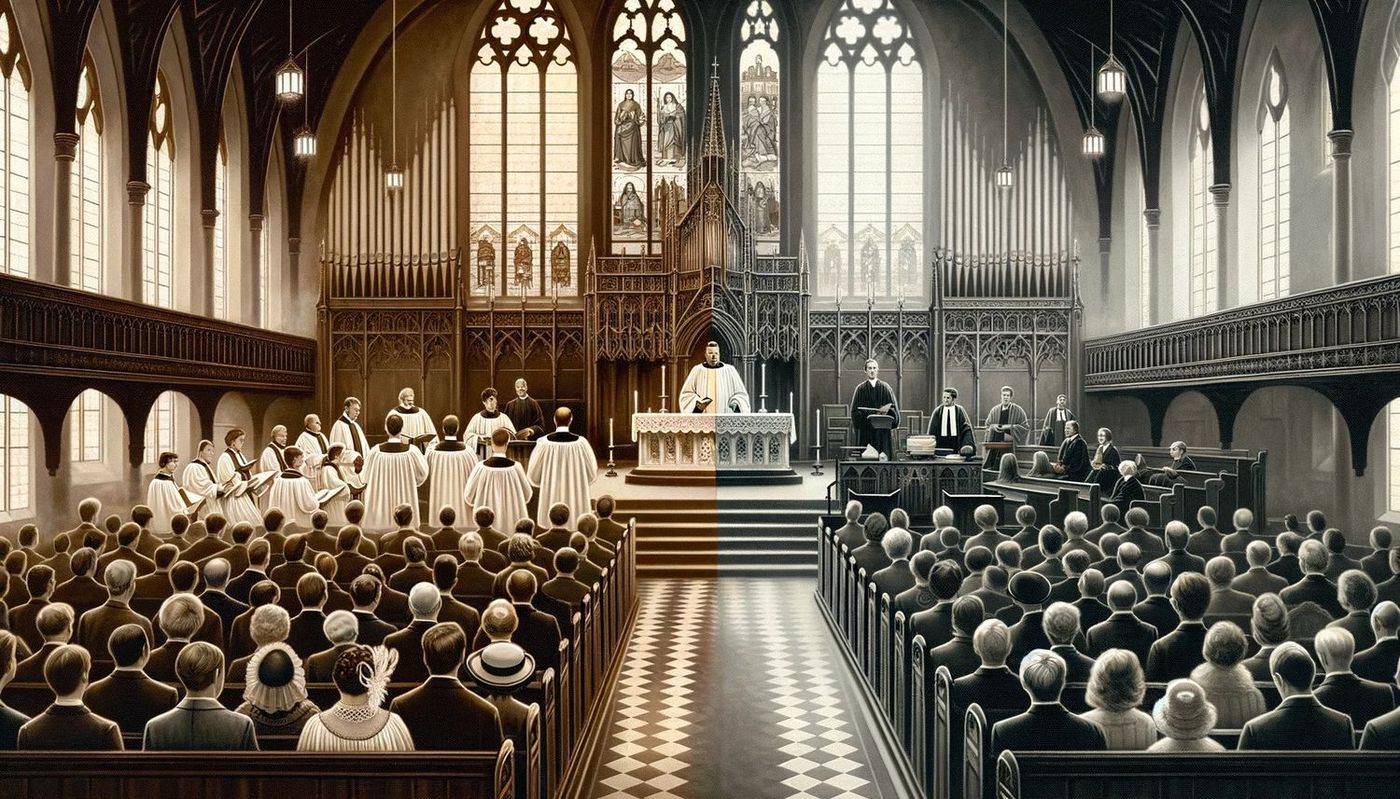Home>Theology and Spirituality>What Is The Difference Between Baptist And Lutheran


Theology and Spirituality
What Is The Difference Between Baptist And Lutheran
Published: February 23, 2024
Ericka Andersen, an editor at Christian.net, expertly merges digital strategy with content creation, focusing on faith and societal issues. Her communication skills enhance the platform's engaging narratives, fostering meaningful dialogue on belief's impact on society.
Discover the key distinctions between Baptist and Lutheran beliefs in theology and spirituality. Explore their differences in doctrine, worship, and religious practices.
(Many of the links in this article redirect to a specific reviewed product. Your purchase of these products through affiliate links helps to generate commission for Christian.net, at no extra cost. Learn more)
Table of Contents
Introduction
The Baptist and Lutheran denominations are two prominent branches of Christianity, each with its own distinct beliefs, practices, and traditions. While both groups share a foundational belief in Jesus Christ as the savior, they differ in various theological interpretations and ecclesiastical structures. Understanding the differences between Baptist and Lutheran faiths can provide valuable insights into the diverse tapestry of Christian traditions.
The Baptist tradition traces its roots to the 17th century, emerging from the English Separatist movement. Baptists emphasize the significance of believer's baptism, which is typically administered to adults who have made a personal confession of faith. This act symbolizes the individual's commitment to Christ and the community of believers. In contrast, Lutheranism originated from the Protestant Reformation led by Martin Luther in the 16th century. Lutherans uphold the teachings of Luther, placing a strong emphasis on grace through faith and the authority of scripture.
As we delve into the distinct aspects of Baptist and Lutheran beliefs, worship practices, church structures, sacraments, and views on salvation, it becomes evident that while both denominations share a common Christian heritage, they have evolved along separate theological trajectories. Understanding these differences can foster a deeper appreciation for the rich diversity within the Christian faith and the various ways in which individuals connect with their spirituality.
Beliefs and Doctrines
Baptist Beliefs and Doctrines
- Sola Scriptura: Baptists adhere to the principle of sola scriptura, emphasizing the ultimate authority of the Bible in matters of faith and practice. They believe that the Bible is the inspired and inerrant word of God, providing guidance for all aspects of life.
- Believer's Baptism: A distinctive feature of Baptist theology is the practice of believer's baptism. This baptism is reserved for individuals who have made a personal profession of faith in Jesus Christ. It symbolizes their commitment to Christ and their identification with His death, burial, and resurrection.
- Autonomy of the Local Church: Baptists uphold the autonomy of the local church, meaning that each congregation operates independently in matters of governance and decision-making. This principle reflects their belief in the priesthood of all believers and the freedom of individual congregations to govern themselves.
- Priesthood of All Believers: Baptists affirm the priesthood of all believers, emphasizing the direct access that every individual has to God through Jesus Christ. This belief underscores the personal responsibility of each believer to engage with scripture and participate in the life of the church.
Lutheran Beliefs and Doctrines
- Grace Alone, Faith Alone, Scripture Alone: Lutherans adhere to the foundational principles of grace alone, faith alone, and scripture alone. They believe that salvation is a result of God's grace, received through faith, and is in accordance with the teachings of the Bible.
- Sacramental Theology: Lutherans recognize two sacraments, baptism, and the Eucharist (also known as the Lord's Supper). They view these sacraments as means of grace, through which God's love and forgiveness are conveyed to believers.
- Theology of the Cross: Lutherans embrace a theology of the cross, emphasizing the centrality of Christ's crucifixion and the redemptive power of His sacrifice. This theological perspective shapes their understanding of suffering, redemption, and the nature of God's love.
- The Three Ecumenical Creeds: Lutherans affirm the Apostles' Creed, the Nicene Creed, and the Athanasian Creed as authoritative statements of faith. These creeds articulate essential Christian beliefs and serve as foundational documents within Lutheran tradition.
The distinct beliefs and doctrines of the Baptist and Lutheran traditions reflect their unique theological emphases and historical developments. While both uphold the core tenets of Christianity, their nuanced interpretations contribute to the rich tapestry of Christian thought and practice.
Worship and Practices
Baptist Worship and Practices
Baptist worship services are characterized by a focus on congregational participation and the preaching of God's Word. Typically, Baptist churches feature a simple and reverent worship environment, often devoid of elaborate religious symbols or ceremonial rituals. The centerpiece of a Baptist worship service is the sermon, where the pastor delivers a message based on biblical teachings, aiming to inspire and instruct the congregation. Hymn singing holds significant importance in Baptist worship, with congregants actively engaging in heartfelt musical expressions of faith. The act of believer's baptism, symbolizing the individual's commitment to Christ, is a pivotal aspect of Baptist worship practices. This ceremony often takes place in the presence of the entire congregation, reinforcing the communal nature of faith within the Baptist tradition.
Lutheran Worship and Practices
Lutheran worship is characterized by a sense of reverence, liturgical structure, and a rich musical tradition. The Lutheran liturgy, which follows a prescribed order of worship, often includes elements such as confession and absolution, readings from scripture, prayers, and the celebration of the Eucharist. The sacrament of the Eucharist, central to Lutheran worship, is conducted with solemnity and reverence, underscoring the belief in the real presence of Christ in the bread and wine. Hymnody holds a prominent place in Lutheran worship, with congregants often singing hymns that reflect the richness of Lutheran theology and tradition. The use of liturgical vestments, candles, and other symbolic elements contributes to the sense of sacredness and continuity within Lutheran worship services.
Contrasting Worship Styles
The contrasting worship styles of Baptists and Lutherans reflect their theological emphases and historical developments. While Baptist worship emphasizes congregational participation, heartfelt preaching, and believer's baptism, Lutheran worship centers on liturgical structure, sacramental significance, and a rich musical heritage. Despite these differences, both traditions seek to create a space for communal worship, spiritual reflection, and the proclamation of God's Word, fostering a deep sense of connection to the divine and to the community of believers.
The distinct worship and practices of the Baptist and Lutheran traditions contribute to the rich tapestry of Christian worship, reflecting the diverse ways in which individuals express their faith and engage in communal acts of devotion.
Church Structure and Leadership
Baptist Church Structure and Leadership
In the Baptist tradition, the church structure is characterized by congregational autonomy and democratic governance. Each local Baptist church operates independently, with its own decision-making body, often referred to as the congregation or church members. This congregational polity reflects the Baptist belief in the priesthood of all believers, affirming the equal standing of every member within the church community. Leadership within Baptist churches typically involves the appointment of pastors or ministers, who are responsible for preaching, pastoral care, and spiritual leadership. While some Baptist churches may have deacons or elders who assist in various aspects of church administration, the ultimate authority rests with the congregation. This decentralized structure allows for a high degree of flexibility and adaptability to local contexts, enabling each congregation to discern its own path under the guidance of the Holy Spirit.
Lutheran Church Structure and Leadership
In contrast, the Lutheran church structure is characterized by a more hierarchical and episcopal model, particularly within the historic Lutheran denominations. Lutherans often have a system of regional or national synods, which oversee the governance and administration of multiple congregations within a defined geographical area. At the local level, Lutheran congregations are typically led by pastors who are ordained within the tradition, and the leadership may be supported by elected councils or boards consisting of congregation members. The role of bishops or regional presiding officers varies within different Lutheran synods, with some having a more centralized leadership structure. This hierarchical approach reflects the Lutheran emphasis on historical continuity and the preservation of doctrinal integrity within the broader church body.
Contrasting Approaches to Church Structure and Leadership
The contrasting approaches to church structure and leadership in the Baptist and Lutheran traditions reflect their respective theological emphases and historical trajectories. While Baptists prioritize congregational autonomy and the priesthood of all believers, Lutherans often embrace a more centralized and hierarchical model, emphasizing historical continuity and doctrinal oversight. These differing structures shape the governance, decision-making processes, and leadership dynamics within each tradition, contributing to the diverse expressions of church life and administration.
The distinct church structures and leadership models of the Baptist and Lutheran traditions underscore the multifaceted nature of Christian ecclesiology, highlighting the various ways in which communities of faith organize themselves and exercise spiritual leadership within the broader tapestry of Christianity.
Sacraments and Rituals
Baptist Sacraments and Rituals
In the Baptist tradition, the concept of sacraments is approached from a symbolic perspective, with a focus on two primary rituals: believer's baptism and the Lord's Supper (also known as communion). Believer's baptism holds a central place in Baptist theology, symbolizing the individual's public confession of faith and their identification with the death, burial, and resurrection of Jesus Christ. This act of immersion baptism signifies the believer's personal commitment to Christ and their initiation into the community of faith. The Lord's Supper, observed as a symbolic memorial of Christ's sacrificial death and resurrection, is conducted with reverence and spiritual significance. However, Baptists do not view these rituals as conveying salvific grace but rather as acts of obedience and remembrance, emphasizing the believer's personal relationship with God.
Lutheran Sacraments and Rituals
Lutherans recognize the sacraments of baptism and the Eucharist as essential components of their faith and practice. Baptism, often administered during infancy or adulthood, signifies the individual's incorporation into the body of Christ and the reception of God's grace. Lutherans believe that through the act of baptism, individuals are united with Christ and become part of the community of believers. The Eucharist, or the Lord's Supper, holds profound significance within Lutheran worship. Lutherans affirm the real presence of Christ in the elements of bread and wine, viewing the sacrament as a means through which God's grace and forgiveness are conveyed to the participants. The Eucharistic celebration is conducted with reverence, emphasizing the spiritual nourishment and communal unity experienced through partaking in the body and blood of Christ.
Contrasting Perspectives on Sacraments and Rituals
The contrasting perspectives on sacraments and rituals between Baptists and Lutherans reflect their theological nuances and historical developments. While Baptists emphasize believer's baptism as a symbolic expression of personal faith and the Lord's Supper as a memorial act, Lutherans hold a sacramental view of these rituals, attributing them with a deeper sense of divine presence and grace. The divergent approaches to sacraments and rituals underscore the varied theological emphases and spiritual practices within the broader Christian tradition, enriching the tapestry of religious expression and belief.
The distinct sacraments and rituals of the Baptist and Lutheran traditions contribute to the multifaceted nature of Christian worship and spiritual life, embodying the diverse ways in which believers engage with sacred rites and symbols within their respective faith communities.
Views on Salvation
Baptist Views on Salvation
Baptists hold a strong emphasis on individual faith and personal conversion in their views on salvation. Central to Baptist theology is the belief in the necessity of a personal relationship with Jesus Christ for salvation. They emphasize the concept of "believer's baptism," viewing it as a public declaration of one's faith and commitment to Christ. Baptists believe that salvation is attained through faith in Jesus Christ alone, and that individuals must consciously accept Christ as their savior to experience redemption and eternal life. This emphasis on personal agency and the decision to follow Christ reflects the Baptist commitment to the autonomy of the individual believer and the significance of personal faith in the process of salvation.
Lutheran Views on Salvation
Lutherans approach the concept of salvation from the perspective of God's grace and the centrality of faith. Rooted in the teachings of Martin Luther, Lutherans emphasize the belief that salvation is a result of God's grace, received through faith in Jesus Christ. They assert that individuals are justified by faith alone, apart from any merit or works of their own. This emphasis on grace through faith underscores the Lutheran understanding of salvation as a gift from God, rather than something that can be earned through human effort. Lutherans also hold a strong belief in the assurance of salvation, affirming that God's grace is sufficient for the redemption of believers and that their salvation is secure in Christ.
Contrasting Perspectives on Salvation
The contrasting perspectives on salvation between Baptists and Lutherans reflect their theological emphases and interpretations of key Christian doctrines. While Baptists prioritize the personal decision to accept Christ as central to salvation, Lutherans emphasize the role of God's grace and the assurance of salvation through faith. These differing views contribute to the rich diversity of theological thought within the Christian tradition, highlighting the multifaceted nature of salvation and the various ways in which different Christian denominations understand and articulate this fundamental aspect of faith.
The distinct views on salvation within the Baptist and Lutheran traditions offer valuable insights into the diverse theological perspectives and spiritual emphases that shape the beliefs and practices of these Christian denominations.
Conclusion
In conclusion, the Baptist and Lutheran denominations, while both rooted in the Christian faith, exhibit distinct theological perspectives, worship practices, church structures, sacramental beliefs, and views on salvation. The Baptist tradition emphasizes believer's baptism, congregational autonomy, and the priesthood of all believers, reflecting a strong emphasis on individual faith and personal commitment to Christ. On the other hand, Lutheranism places a significant emphasis on grace through faith, sacramental theology, liturgical worship, and a more hierarchical church structure, underscoring the centrality of God's grace and the assurance of salvation through faith.
The diverse tapestry of beliefs and practices within the Baptist and Lutheran traditions enriches the broader landscape of Christian spirituality, offering individuals varied avenues for engaging with their faith and connecting with the divine. While Baptists and Lutherans may differ in their theological emphases and ecclesiastical structures, both traditions share a common commitment to following Christ and proclaiming the gospel message.
Understanding the differences between these two denominations not only fosters a deeper appreciation for the rich diversity within the Christian faith but also encourages dialogue, mutual respect, and collaboration among believers from various Christian traditions. It is through this spirit of understanding and unity that the global Christian community can continue to grow and thrive, embracing the richness of its theological heritage while celebrating the common foundation of faith in Jesus Christ.
As individuals engage with the distinct beliefs, worship practices, church structures, sacraments, and views on salvation within the Baptist and Lutheran traditions, they are invited to explore the multifaceted expressions of Christian spirituality and the myriad ways in which believers seek to live out their faith in the world. Ultimately, the differences between these denominations serve as a testament to the depth and breadth of Christian thought and practice, offering a vibrant tapestry of spiritual expression within the broader Christian family.











